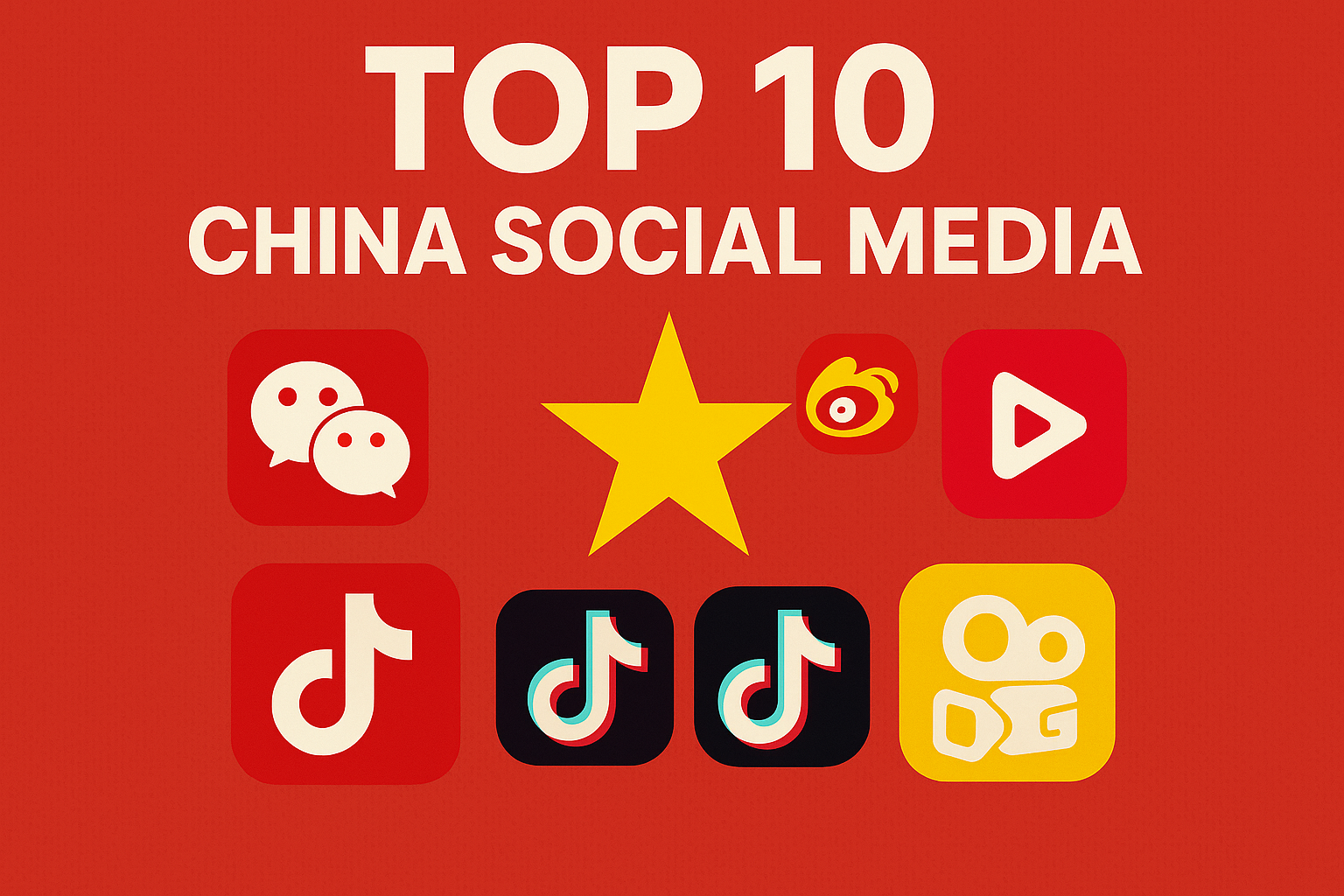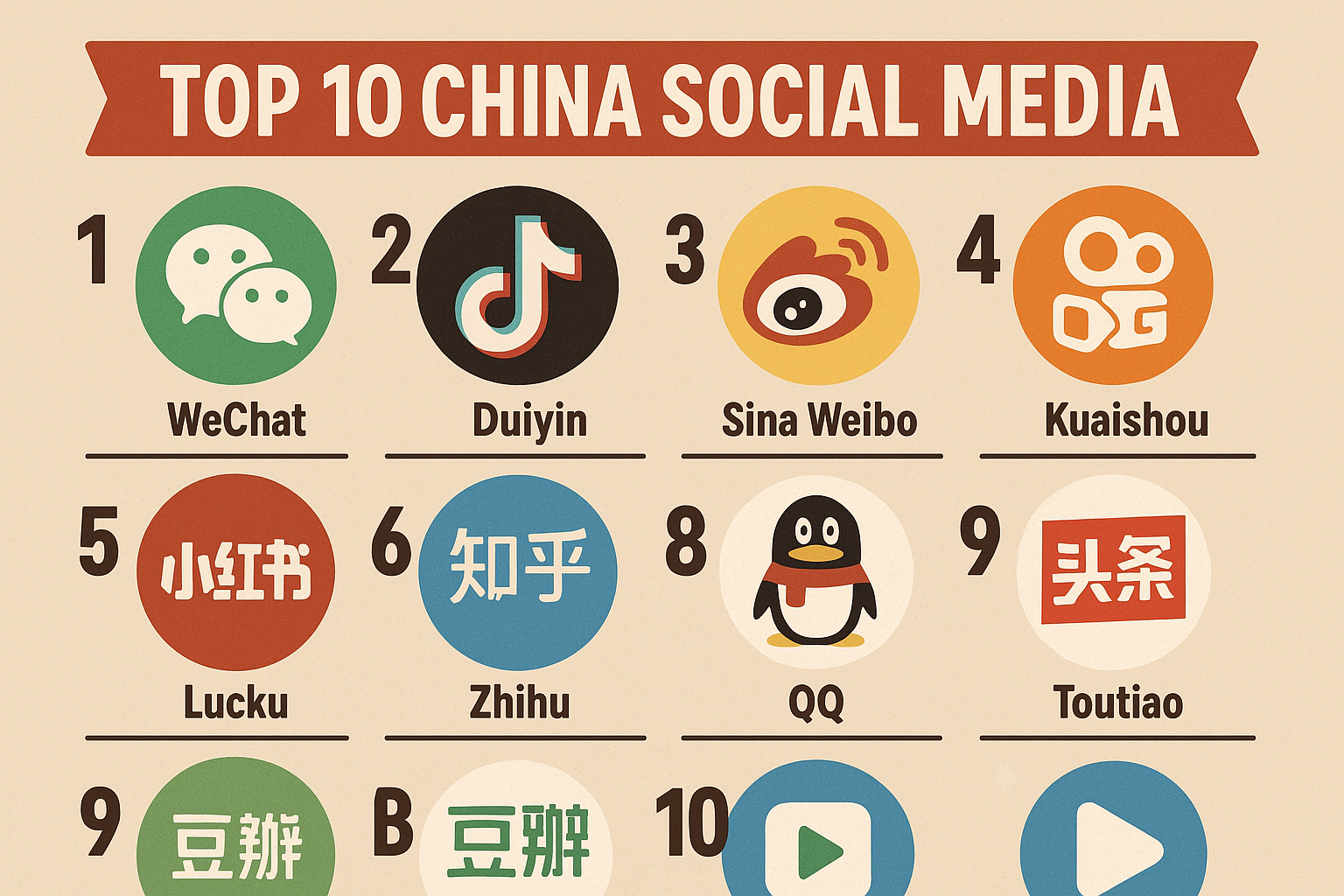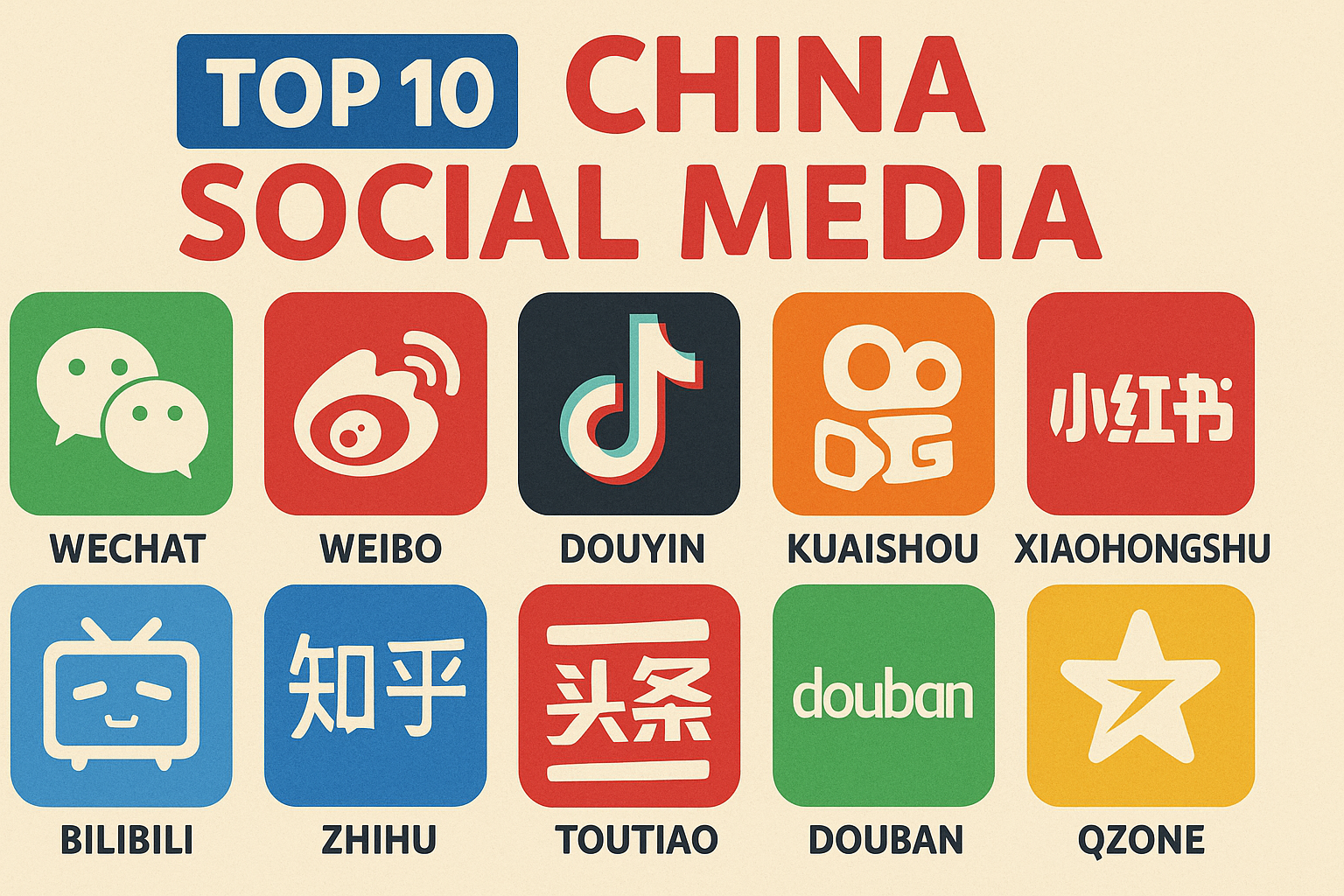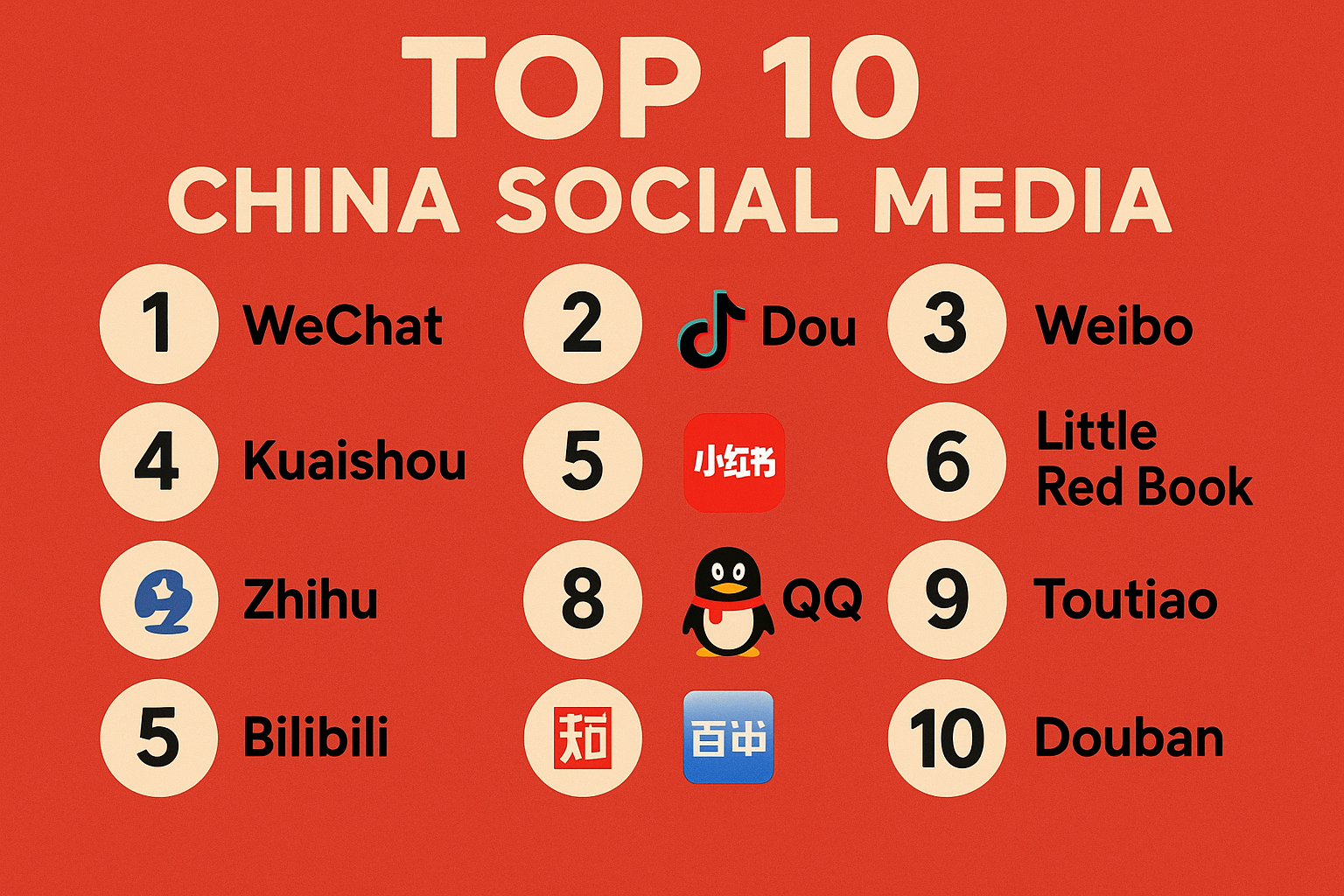Did you know that China has over 1 billion active social media users, yet most Western platforms like Facebook, Twitter, and YouTube are blocked? Welcome to the fascinating world of Chinese social media—a digital ecosystem that’s not only massive but also incredibly innovative and diverse. Understanding the top 10 China social media platforms is crucial for anyone looking to tap into the world’s largest consumer market.
China’s social media landscape operates in a unique digital environment where homegrown platforms have flourished, creating features and functionalities that often surpass their Western counterparts. From super-apps that combine messaging, payments, and shopping to short-video platforms that have taken the world by storm, Chinese social media offers incredible opportunities for businesses, marketers, and content creators.
Key Takeaways

• WeChat dominates with over 1.3 billion users, functioning as a super-app for messaging, payments, and business • Short-video platforms like Douyin (TikTok’s Chinese version) and Kuaishou lead engagement trends • E-commerce integration is seamless across most Chinese social platforms, unlike Western counterparts • Professional networking thrives on platforms like Maimai, China’s answer to LinkedIn • Live streaming and KOL marketing are essential strategies for success on Chinese social media
Understanding these platforms isn’t just about numbers—it’s about accessing a market that represents nearly 20% of the world’s population and has a growing middle class with significant purchasing power.
Understanding China’s Unique Social Media Ecosystem
Before diving into the top 10 China social media platforms, it’s essential to understand what makes this digital landscape so unique. China’s social media ecosystem developed independently due to the Great Firewall, which blocks many Western platforms. This isolation led to the creation of innovative, feature-rich platforms that often exceed their Western counterparts in functionality.
Key Characteristics of Chinese Social Media:
- Super-app functionality: Many platforms combine multiple services
- E-commerce integration: Shopping is seamlessly built into social experiences
- Mobile-first design: Optimized for smartphone usage from the ground up
- QR code culture: Quick Response codes are central to user interaction
- Live streaming focus: Real-time video content is extremely popular
The Chinese social media market is also characterized by rapid innovation, with platforms constantly adding new features to keep users engaged. This has created an environment where social media platforms evolve quickly and user expectations are incredibly high.
The Top 10 China Social Media Platforms
1. WeChat (微信) – The Ultimate Super-App 🏆
User Base: 1.3+ billion active users Primary Function: Messaging, payments, mini-programs, business services
WeChat isn’t just a messaging app—it’s a complete digital ecosystem. Launched by Tencent in 2011, WeChat has become the backbone of digital life in China. Users can send messages, make payments, book taxis, order food, read news, play games, and conduct business all within a single app.
Key Features:
- Moments: Social sharing similar to Facebook’s timeline
- Mini-programs: Apps within the app for various services
- WeChat Pay: Integrated payment system
- Official Accounts: Business and media presence
- Work Chat: Enterprise communication tools
Business Opportunities: WeChat offers incredible opportunities for businesses through Official Accounts, which allow companies to create a presence similar to a Facebook page. The platform’s mini-programs enable businesses to create app-like experiences without users needing to download separate applications.
“WeChat has fundamentally changed how Chinese consumers interact with brands, making it the most important platform for any business entering the Chinese market.”
2. Douyin (抖音) – China’s TikTok Phenomenon 📱
User Base: 750+ million daily active users Primary Function: Short-form video content
Douyin is the Chinese version of TikTok, owned by ByteDance. While TikTok serves international markets, Douyin caters specifically to Chinese users with content and features tailored to local preferences.
Key Features:
- 15-second to 10-minute videos: Flexible content lengths
- Advanced AI algorithm: Highly personalized content feed
- Live streaming: Real-time interaction with followers
- E-commerce integration: Direct shopping from videos
- AR filters and effects: Creative content tools
Content Strategy Tips:
- Focus on trending hashtags and challenges
- Collaborate with Key Opinion Leaders (KOLs)
- Integrate product placements naturally
- Use local cultural references and humor
3. Weibo (微博) – China’s Twitter Alternative 🐦
User Base: 580+ million monthly active users Primary Function: Microblogging and news sharing
Weibo, often called “China’s Twitter,” is a microblogging platform where users share short posts, images, and videos. It’s particularly popular for news, celebrity updates, and public discourse.
Key Features:
- 280-character limit: Similar to Twitter’s format
- Hot Search trends: Real-time trending topics
- Celebrity presence: Major platform for Chinese celebrities
- Live streaming: Integrated video broadcasting
- Super Topics: Community discussions around specific interests
Marketing Potential: Weibo is excellent for brand awareness, crisis management, and influencer marketing. The platform’s trending topics feature makes it ideal for viral marketing campaigns.
4. Kuaishou (快手) – The People’s Short Video Platform 🎬
User Base: 380+ million daily active users Primary Function: Short-form video sharing
Kuaishou positions itself as a more inclusive alternative to Douyin, focusing on users from smaller cities and rural areas. It emphasizes authentic, everyday content over polished productions.
Key Features:
- Democratic content discovery: Less algorithm-driven than Douyin
- Live streaming focus: Strong emphasis on real-time interaction
- E-commerce integration: Shopping features built-in
- Inclusive community: Represents diverse Chinese demographics
- Longer video options: Supports various content lengths
Unique Positioning: While Douyin attracts urban, younger users, Kuaishou has successfully captured audiences in China’s smaller cities and rural areas, representing a different but equally valuable market segment.
5. Xiaohongshu (小红书) – The Lifestyle Discovery Platform 🛍️
User Base: 300+ million monthly active users Primary Function: Lifestyle sharing and product discovery
Xiaohongshu, also known as “Little Red Book,” combines social media with e-commerce, focusing on lifestyle content, product reviews, and shopping recommendations.
Key Features:
- Visual content focus: High-quality images and videos
- Product reviews: Authentic user-generated content
- Shopping integration: Direct purchase options
- Lifestyle categories: Fashion, beauty, travel, food
- KOL ecosystem: Strong influencer community
Target Audience: Primarily young, affluent women in first and second-tier cities who are interested in fashion, beauty, travel, and lifestyle products.
6. Bilibili (哔哩哔哩) – The Gen Z Entertainment Hub 🎮
User Base: 290+ million monthly active users Primary Function: Video sharing with focus on anime, gaming, and youth culture
Bilibili started as a platform for anime and gaming content but has evolved into a comprehensive entertainment platform popular with China’s younger generation.
Key Features:
- Bullet comments: Real-time comments that scroll across videos
- Gaming focus: Strong gaming community and content
- Live streaming: Interactive broadcasting features
- Original content: Platform-exclusive shows and series
- Youth culture: Memes, trends, and generational content
Content Opportunities: Brands targeting younger demographics can find success on Bilibili through gaming partnerships, anime-style content, and youth-oriented campaigns.
7. Zhihu (知乎) – China’s Knowledge Sharing Platform 🧠
User Base: 220+ million monthly active users Primary Function: Q&A and knowledge sharing
Zhihu is China’s equivalent to Quora, where users ask questions and receive detailed, high-quality answers from experts and knowledgeable community members.
Key Features:
- Q&A format: Question and answer discussions
- Expert community: Verified professionals and specialists
- Long-form content: Detailed, informative posts
- Topic following: Interest-based content discovery
- Professional insights: Industry expertise sharing
Business Applications: Zhihu is excellent for thought leadership, professional branding, and reaching educated, affluent audiences seeking detailed information.
8. Maimai (脉脉) – Professional Networking Platform 💼
User Base: 150+ million registered users Primary Function: Professional networking and career development
Maimai serves as China’s primary professional networking platform, similar to LinkedIn but tailored specifically for Chinese business culture and practices.
Key Features:
- Professional profiles: Career-focused user profiles
- Industry insights: Business news and analysis
- Job opportunities: Career advancement features
- Company reviews: Workplace culture insights
- Professional groups: Industry-specific communities
B2B Opportunities: Essential for B2B marketing, recruitment, and professional brand building in China. The platform is particularly valuable for companies in the technology, finance, and consulting sectors.
9. Momo (陌陌) – Location-Based Social Discovery 📍
User Base: 100+ million monthly active users Primary Function: Location-based social networking and live streaming
Momo focuses on helping users discover and connect with people nearby, combining location-based features with live streaming and entertainment.
Key Features:
- Location discovery: Find people and events nearby
- Live streaming: Interactive video broadcasting
- Group chats: Local community discussions
- Entertainment features: Games and virtual gifts
- Video calls: Face-to-face communication tools
Unique Position: While not as large as other platforms, Momo serves a specific niche for location-based social discovery and has a strong live streaming community.
10. Tantan (探探) – Social Discovery and Dating 💕
User Base: 90+ million registered users Primary Function: Dating and social discovery
Tantan is China’s most popular dating app, similar to Tinder but adapted for Chinese dating culture and preferences.
Key Features:
- Swipe mechanism: Similar to Tinder’s interface
- Video profiles: Enhanced user profiles
- Social verification: Authenticity features
- Cultural adaptation: Designed for Chinese dating norms
- Safety features: User protection measures
Market Significance: While primarily a dating platform, Tantan represents the growing market for lifestyle and personal connection apps in China.
🇨🇳 China Social Media Platform Explorer
Compare and discover the top Chinese social media platforms based on your needs
Platform Comparison and Analysis

User Demographics Breakdown
Understanding the demographics of each platform is crucial for targeting the right audience. Here’s how the top 10 China social media platforms break down:
| Platform | Primary Age Group | Gender Split | Geographic Focus |
|---|---|---|---|
| All ages | Balanced | Nationwide | |
| Douyin | 18-35 | Slight female majority | Urban-focused |
| 20-40 | Balanced | Urban centers | |
| Kuaishou | 25-45 | Slight male majority | Smaller cities/rural |
| Xiaohongshu | 18-35 | 70% female | Tier 1 & 2 cities |
| Bilibili | 16-30 | 60% male | Urban youth |
| Zhihu | 25-45 | Slight male majority | Educated urban |
| Maimai | 25-50 | Balanced | Business centers |
| Momo | 20-35 | Balanced | Urban areas |
| Tantan | 18-35 | Balanced | Urban singles |
Revenue Models and Monetization
Each platform has developed unique monetization strategies:
Advertising-Based Models:
- Douyin and Kuaishou rely heavily on video advertising
- Weibo uses promoted posts and display advertising
- Bilibili combines advertising with premium memberships
E-commerce Integration:
- WeChat’s mini-programs enable direct sales
- Xiaohongshu seamlessly blends content with shopping
- Live streaming commerce is popular across video platforms
Subscription and Premium Services:
- Bilibili offers premium memberships for ad-free viewing
- Professional platforms like Maimai have premium features
- Dating apps like Tantan use freemium models
Marketing Strategies for Chinese Social Media
Content Localization Best Practices
Success on Chinese social media requires more than translation—it demands cultural adaptation. Here are key strategies for the top 10 China social media platforms:
Cultural Sensitivity:
- Understand Chinese holidays, traditions, and cultural references
- Respect local values and social norms
- Avoid sensitive political or social topics
Visual Design Preferences:
- Chinese users prefer colorful, dynamic visual content
- Red and gold colors are associated with luck and prosperity
- QR codes should be prominently featured for easy sharing
Content Timing:
- Peak usage times vary by platform and user demographics
- Consider Chinese time zones and work schedules
- Holiday seasons like Chinese New Year drive massive engagement
Influencer Marketing (KOL Strategy)
Key Opinion Leaders (KOLs) are central to Chinese social media marketing success. The SEM agencies landscape in China heavily relies on KOL partnerships.
Types of KOLs:
- Celebrity KOLs: Major stars with millions of followers
- Professional KOLs: Industry experts and thought leaders
- Micro-KOLs: Niche influencers with engaged audiences
- Live streaming KOLs: Real-time product demonstrators
Platform-Specific KOL Strategies:
- WeChat: Focus on Official Account collaborations
- Douyin: Partner with viral content creators
- Xiaohongshu: Work with lifestyle and fashion influencers
- Bilibili: Collaborate with gaming and entertainment creators
E-commerce Integration Tactics
Chinese social media platforms excel at blending social interaction with shopping experiences:
Live Streaming Commerce:
- Real-time product demonstrations
- Interactive Q&A sessions with viewers
- Limited-time offers and flash sales
- Celebrity endorsements during live streams
Social Shopping Features:
- In-app purchase capabilities
- User-generated product reviews
- Social proof through friend recommendations
- Group buying and social discounts
Technical Considerations and Compliance
Data Privacy and Regulations
Operating on Chinese social media platforms requires understanding local regulations:
Key Compliance Areas:
- Cybersecurity Law: Data protection and storage requirements
- Advertising Law: Truth in advertising and content restrictions
- Content Regulations: Prohibited content and censorship guidelines
- Business Registration: Requirements for foreign companies
Data Localization:
- User data must be stored within China
- Regular security audits may be required
- Compliance with government data requests
- Understanding of cross-border data transfer restrictions
Platform Integration and APIs
Each platform offers different levels of integration capabilities:
WeChat Ecosystem:
- Mini-program development opportunities
- WeChat Pay integration for businesses
- Official Account API access
- Customer service integration tools
Content Management:
- Multi-platform content distribution strategies
- Automated posting and scheduling tools
- Analytics and performance tracking
- Crisis management and response protocols
Future Trends in Chinese Social Media

Emerging Technologies and Features
The top 10 China social media platforms continue to innovate with cutting-edge technologies:
Artificial Intelligence Integration:
- Advanced content recommendation algorithms
- AI-powered content creation tools
- Automated customer service chatbots
- Personalized shopping recommendations
Augmented Reality (AR) and Virtual Reality (VR):
- AR filters and effects for content creation
- Virtual try-on experiences for e-commerce
- VR live streaming and events
- Immersive brand experiences
Blockchain and Digital Assets:
- NFT marketplaces on social platforms
- Cryptocurrency integration for payments
- Blockchain-based content verification
- Digital collectibles and virtual goods
Market Evolution Predictions
Platform Consolidation:
- Smaller platforms may merge or be acquired
- Super-app functionality will continue expanding
- Cross-platform integration will increase
- International expansion efforts will grow
User Behavior Changes:
- Increased demand for authentic, user-generated content
- Growing importance of social commerce
- Rising popularity of live streaming and real-time interaction
- Greater focus on privacy and data security
The landscape of Chinese social media will continue evolving rapidly, with platforms adapting to changing user preferences and technological advances. Businesses looking to succeed in this market must stay agile and responsive to these trends.
Success Stories and Case Studies
International Brands Winning on Chinese Social Media
Several international companies have successfully navigated the top 10 China social media landscape:
Nike’s Douyin Strategy: Nike created engaging short-video content featuring Chinese athletes and cultural elements, resulting in millions of followers and significant brand engagement. Their strategy focused on:
- Collaborating with local sports influencers
- Creating challenges and hashtag campaigns
- Showcasing products through lifestyle content
- Integrating Chinese cultural elements authentically
Starbucks’ WeChat Innovation: Starbucks leveraged WeChat’s mini-program functionality to create a seamless ordering and payment experience:
- Social gifting features allowing users to send drinks to friends
- Location-based store finding and menu browsing
- Loyalty program integration with social sharing
- Personalized recommendations based on user preferences
Domestic Success Examples
Perfect Diary’s Xiaohongshu Domination: This Chinese cosmetics brand built its entire marketing strategy around Xiaohongshu:
- Partnering with beauty KOLs for authentic product reviews
- Creating visually stunning content that inspired user-generated posts
- Leveraging user feedback for product development
- Building a community of brand advocates and loyal customers
The success of these brands demonstrates the importance of understanding platform-specific features and user behaviors when developing social media strategies for China.
Getting Started: Your Action Plan
Phase 1: Research and Planning (Weeks 1-2)
Market Research:
- Analyze your target audience demographics
- Study competitor presence on Chinese platforms
- Identify the most relevant platforms for your industry
- Research local cultural preferences and trends
Resource Allocation:
- Budget planning for platform setup and content creation
- Team training on Chinese social media best practices
- Technology infrastructure for compliance and management
- Partnership development with local agencies or consultants
Phase 2: Platform Setup and Content Strategy (Weeks 3-6)
Account Creation and Verification:
- Register official accounts on priority platforms
- Complete verification processes for business accounts
- Set up payment and e-commerce integrations where applicable
- Develop brand guidelines adapted for Chinese audiences
Content Planning:
- Create platform-specific content calendars
- Develop localized messaging and visual assets
- Plan KOL collaboration strategies
- Establish crisis management protocols
Phase 3: Launch and Optimization (Weeks 7-12)
Soft Launch:
- Begin posting content on selected platforms
- Monitor engagement and user feedback
- Test different content types and posting times
- Gather data for optimization
Performance Analysis:
- Track key performance indicators (KPIs) for each platform
- Analyze user engagement and conversion rates
- Adjust strategies based on performance data
- Scale successful campaigns and content types
For businesses looking to expand their digital marketing efforts, understanding the broader search engine landscape can complement social media strategies effectively.
Common Mistakes to Avoid

Cultural Missteps
Language and Translation Errors:
- Direct translation without cultural context consideration
- Using inappropriate tone or formality levels
- Misunderstanding local slang and expressions
- Ignoring regional differences within China
Visual and Design Mistakes:
- Using colors or symbols with negative cultural connotations
- Inappropriate imagery or cultural representations
- Ignoring local design preferences and trends
- Poor quality content that doesn’t meet platform standards
Strategic Errors
Platform Selection Mistakes:
- Trying to be present on all platforms without sufficient resources
- Choosing platforms based on size rather than audience fit
- Ignoring platform-specific features and best practices
- Failing to understand platform demographics and user behavior
Compliance Oversights:
- Inadequate understanding of local regulations
- Improper content that violates platform guidelines
- Insufficient data protection and privacy measures
- Lack of proper business registration and licensing
Operational Challenges
Resource Management:
- Underestimating the time and effort required for success
- Insufficient local expertise and cultural understanding
- Poor integration between different platform strategies
- Inadequate crisis management and response planning
Understanding these common pitfalls can help businesses avoid costly mistakes and build more effective social media strategies in China.
Tools and Resources for Success
Essential Management Tools
Content Management Platforms:
- Weibo Management Tools: Official Weibo business tools for scheduling and analytics
- WeChat Official Account Platforms: Built-in management systems for businesses
- Third-party Solutions: Comprehensive platforms that manage multiple Chinese social media accounts
Analytics and Monitoring:
- Platform-native analytics tools for performance tracking
- Social listening tools for brand monitoring and sentiment analysis
- Competitor analysis platforms for market intelligence
- ROI tracking systems for campaign effectiveness measurement
Educational Resources
Industry Reports and Research:
- Annual social media usage reports from Chinese tech companies
- Market research from firms like McKinsey, Nielsen, and local agencies
- Platform-specific user behavior studies and trend analyses
- Government publications on digital marketing regulations
Training and Certification Programs:
- Platform-specific certification programs (WeChat, Douyin, etc.)
- Digital marketing courses focused on Chinese markets
- Cultural sensitivity and localization training programs
- Legal compliance workshops for foreign businesses
For comprehensive digital marketing insights, exploring keyword optimization strategies can provide valuable lessons applicable to social media content creation.
Measuring Success and ROI
Key Performance Indicators (KPIs)
Engagement Metrics:
- Follower Growth Rate: Monthly and quarterly audience expansion
- Engagement Rate: Likes, comments, shares, and saves per post
- Content Reach: Organic and paid content visibility
- Video Completion Rates: Particularly important for Douyin and Kuaishou
Business Impact Metrics:
- Lead Generation: Contact forms, inquiries, and sales qualified leads
- Conversion Rates: From social media traffic to actual sales
- Customer Acquisition Cost: Cost per new customer from social media
- Brand Awareness: Surveys and social listening sentiment analysis
ROI Calculation Methods
Direct Revenue Attribution:
- Track sales directly linked to social media campaigns
- Monitor e-commerce integration performance
- Calculate customer lifetime value from social media acquisitions
- Measure repeat purchase rates from social media customers
Indirect Value Measurement:
- Brand awareness and sentiment improvements
- Customer service cost reductions through social channels
- Market research and customer insight value
- Long-term brand building and market positioning benefits
Understanding how to measure success helps businesses optimize their strategies and demonstrate the value of their Chinese social media investments.
Building Long-term Relationships
Community Building Strategies
Authentic Engagement:
- Respond promptly and personally to user comments and messages
- Create content that encourages user participation and discussion
- Share user-generated content to build community loyalty
- Host live events and Q&A sessions to connect directly with audiences
Value-Driven Content:
- Provide educational content that helps users solve problems
- Share industry insights and expert knowledge
- Offer exclusive deals and early access to products
- Create entertaining content that reflects brand personality
Customer Service Excellence
Multi-Platform Support:
- Maintain consistent customer service across all platforms
- Train teams on platform-specific communication styles
- Implement efficient response systems for different types of inquiries
- Create escalation procedures for complex issues
Proactive Communication:
- Monitor brand mentions and respond to feedback promptly
- Address potential issues before they become major problems
- Share updates about products, services, and company news
- Celebrate customer successes and milestones
Building strong relationships on Chinese social media platforms requires consistent effort, cultural understanding, and genuine commitment to serving the community.
Conclusion
The top 10 China social media platforms represent one of the world’s most dynamic and innovative digital ecosystems. From WeChat’s super-app functionality to Douyin’s viral video content, these platforms offer unprecedented opportunities for businesses, marketers, and content creators to connect with over a billion active users.
Success in this market requires more than simply translating Western social media strategies. It demands deep cultural understanding, platform-specific expertise, and a commitment to building authentic relationships with Chinese audiences. The platforms we’ve explored—WeChat, Douyin, Weibo, Kuaishou, Xiaohongshu, Bilibili, Zhihu, Maimai, Momo, and Tantan—each serve unique purposes and audiences within the broader Chinese digital landscape.
The integration of e-commerce, live streaming, and social interaction sets Chinese platforms apart from their Western counterparts. Features like WeChat’s mini-programs, Douyin’s seamless shopping integration, and Xiaohongshu’s lifestyle-focused commerce represent the future of social media globally.
For businesses looking to expand into the Chinese market, understanding these platforms is not optional—it’s essential. The strategies, tools, and insights provided in this guide offer a roadmap for navigating this complex but rewarding landscape.
Your Next Steps:
- Assess your target audience and identify the most relevant platforms for your business goals
- Develop a localized content strategy that respects Chinese culture and platform-specific best practices
- Start with one or two platforms to build expertise before expanding your presence
- Invest in local partnerships or hire team members with Chinese social media expertise
- Monitor performance closely and be prepared to adapt your strategies based on user feedback and platform changes
The Chinese social media landscape will continue evolving rapidly, with new features, technologies, and user behaviors emerging regularly. Staying informed about these changes and maintaining flexibility in your approach will be key to long-term success.
For additional insights into digital marketing strategies and platform optimization, explore our comprehensive guides on Amazon keyword optimization and hotel industry marketing, which offer valuable lessons applicable to social media marketing.
Whether you’re a small business looking to test the waters or a large corporation planning a major expansion, the top 10 China social media platforms offer incredible opportunities for growth, engagement, and success in the world’s largest consumer market. The key is to approach this market with respect, preparation, and a genuine commitment to serving Chinese users’ needs and preferences.
For more insights and case studies on successful digital marketing strategies, visit our blog and explore our backlink case study to understand how integrated digital marketing approaches can amplify social media success.
SEO Meta Information
Meta Title: Top 10 China Social Media Platforms: Complete Guide 2025 Meta Description: Discover the top 10 China social media platforms including WeChat, Douyin, and Weibo. Complete guide with user stats, marketing strategies, and success tips.



